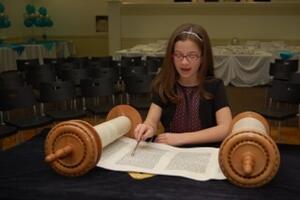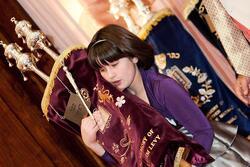The Aliyah Situation
I used to spend every Simchat Torah annoyed at my mom. Not only would she force me to dance with the Torah in the women’s section, she would also run around the room and grab my friends by the arm, pulling them into the hora when they just wanted to hang out and eat candy in peace. It was super embarrassing, and I would say to her, “You aren’t their mom, you’re my mom.” And every year she would continue to pull my friends into the circle against their will.
I grew up with easy access to the Torah. I carried it through the women’s section in my synagogue, kissed it as it was returned to the Aron Kodesh (ark), and read from it at the all-women service at my Bat Mitzvah. It was not some far off concept on the other side of the mechitza. In fact, I was shocked when I found out that a woman carrying the Torah was considered progressive in the Los Angeles Modern Orthodox community. However, I didn’t give it too much thought.
The service I usually attended on Simchat Torah was an all-women service in my synagogue, where we would read the last and first chapters of the Torah and then dance with it. It was the only service I had ever attended on Simchat Torah, and it was my norm. But B’nai Akiva, a Modern Orthodox youth group, was holding a teen service for the first time, and I was planning to attend. I was excited about it because I would get to celebrate the holiday with friends who I mostly see in school.
A few hours before chag, I got a call from a teacher at my school who works with the Los Angeles chapter of B’nai Akiva. She called because she figured I was the person to talk to about making the service “women-friendly,” as it was hosted by a more traditional synagogue than what I was used to. Their women’s section was cramped and in the back of the synagogue, and only men had access to the Torah. Evidently, this would affect the teen service they were hosting, even if it wasn’t the main service. Honored that she approached me with this concern, I happily agreed to figure out ways to make the service as equitable as possible. After some discussion, I asked, “Are they going to let us carry the Torah?”
My teacher responded reluctantly, “No, even though I pushed. Hard.” I paused for a moment, but decided that it would be a good challenge for me to find a creative way to make the girls an equal part of the service. We moved on in our discussion, throwing ideas back and forth, getting excited when we found one that we liked.
“Obviously the Aliyah situation is frustrating...” My teacher said. I wasn’t sure what she was referring to as the “Aliyah situation”; I knew that the weekly Torah portion reading was broken up into seven sections, each one referred to as an Aliyah, and that one male member of the service got to go up and say a blessing for each section. However, this happened every Shabbat; why was it different on Simchat Torah?
We finished our conversation, right as my mother walked into my room. I told her about my discussion with my teacher, excited about the ideas we came up with.
“Oh, and they won’t let us carry the Torah, but—”
“Ok, so we won’t participate.”
I stopped. “Wait, but we have other idea—”
“Neima, this is bigger than you.” My mom left my room to write some emails, leaving me dumbfounded. I guess I understood. My mom had always been involved in synagogue politics. About an hour later, we returned to talking about the service that I would no longer be attending. I was helping my mom in the kitchen.
“I should have seen it coming,” She said as she put away the dishes, “And the whole Aliyah situation, what was I expecting?” Again, what was this “Aliyah situation” and why, specifically on Simchat Torah, did it matter so much?
“What 'Aliyah situation'?” I finally inquired.
“You know, how on Simchat Torah every single man in the synagogue gets an Aliyah.” I stared at her blankly.
“You didn’t know about that?” She looked up from the dishes.
“And the women just sit there?”
“Yeah, it’s horrifying. They just schmooze on the other side of the mechitza. It’s why we have the all-women reading on Simchat Torah. You seriously never knew about this?”
“Why would I? I spend every Simchat Torah in the women’s service.”
The phrase “every single man” repeated in my head as I proceeded to get ready for chag. Every single man. Every single man was able to stand at the forefront of our religion and act as a leader, no questions asked. Every single man could read from the Torah without turning any heads. Every single man could wear tefillin in the morning, and it was so normal for them that they might complain about it sometimes. I wish my problem was having to put on tefillin every morning.
But when it came to the Aliyot, I wondered, how could I have never known about this ritual? In my seventeen years of living as a Modern Orthodox Jew, I was never exposed to this tradition that now deeply angered me. I could just imagine sitting on the other side of the mechitza for an hour, a bystander to my religion.
That Simchat Torah night, I saw the Torah not as something I had easy access to, but something generations of women had to fight to even touch, let alone dance with. I now also understood why my mother pulled people into the hora. She had attended synagogues where the women were pushed to the sidelines. She knew what it was like to be an afterthought. So when other women didn’t take the chance to celebrate God’s gift that generations of women had to fight to even touch, it frustrated her.
My mother did not have to pull on any arms for me to celebrate the Torah that night. I danced intensely in joy and happiness, my feet blistering and my voice nearly gone. The women around me sang “Torah tziva lanu Moshe!” This Torah was commanded upon us by Moshe! Upon us. All of us. I wanted to hold the Torah, to hug it, and to share it with the women around me. I wanted to grab women and girls by the arm who didn’t realize how lucky they were, just like my mother, and tell them that this Torah belongs to them.
This piece was written as part of JWA’s Rising Voices Fellowship.







This is lovely!
Beautiful storytelling! Thank you for sharing.